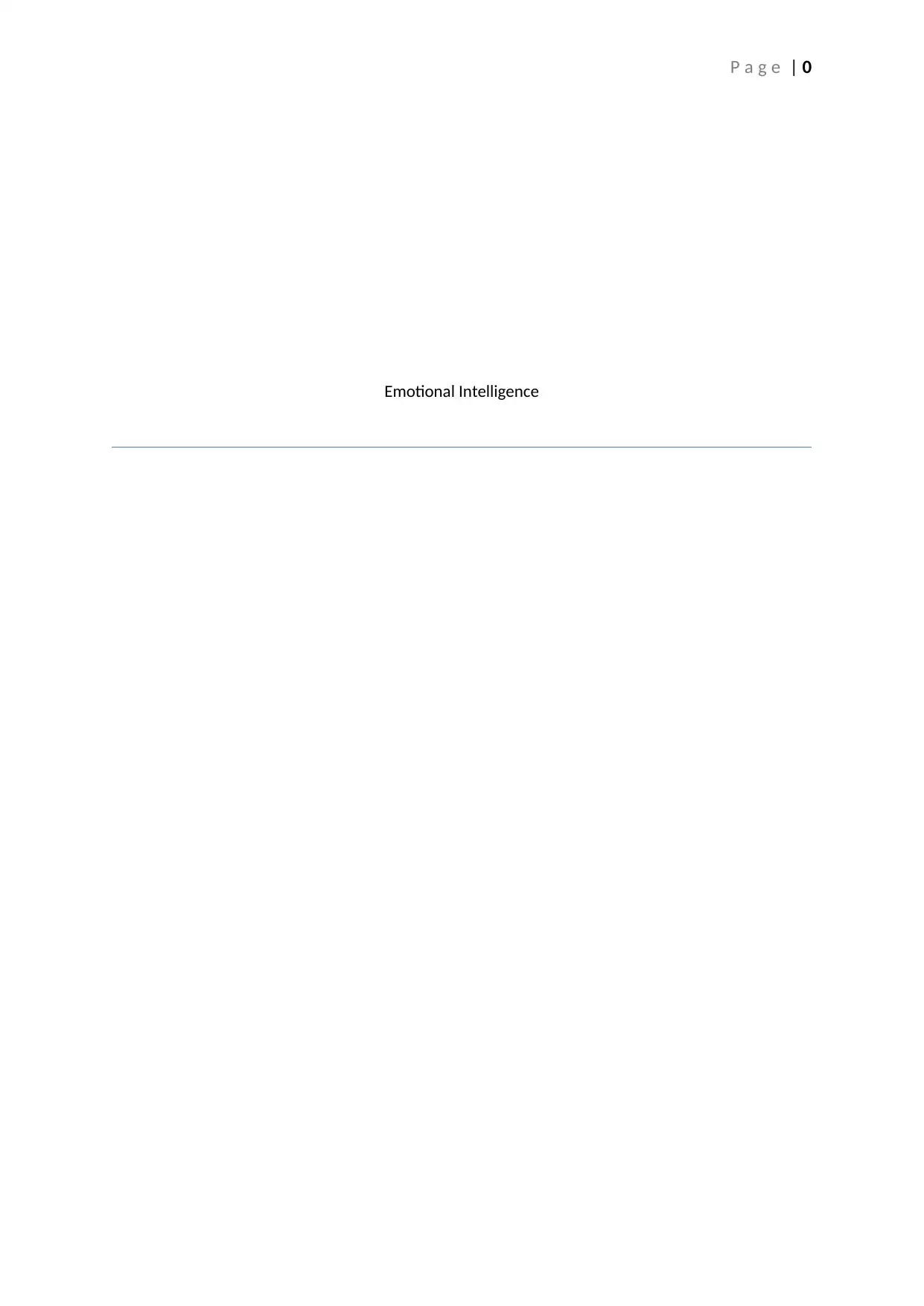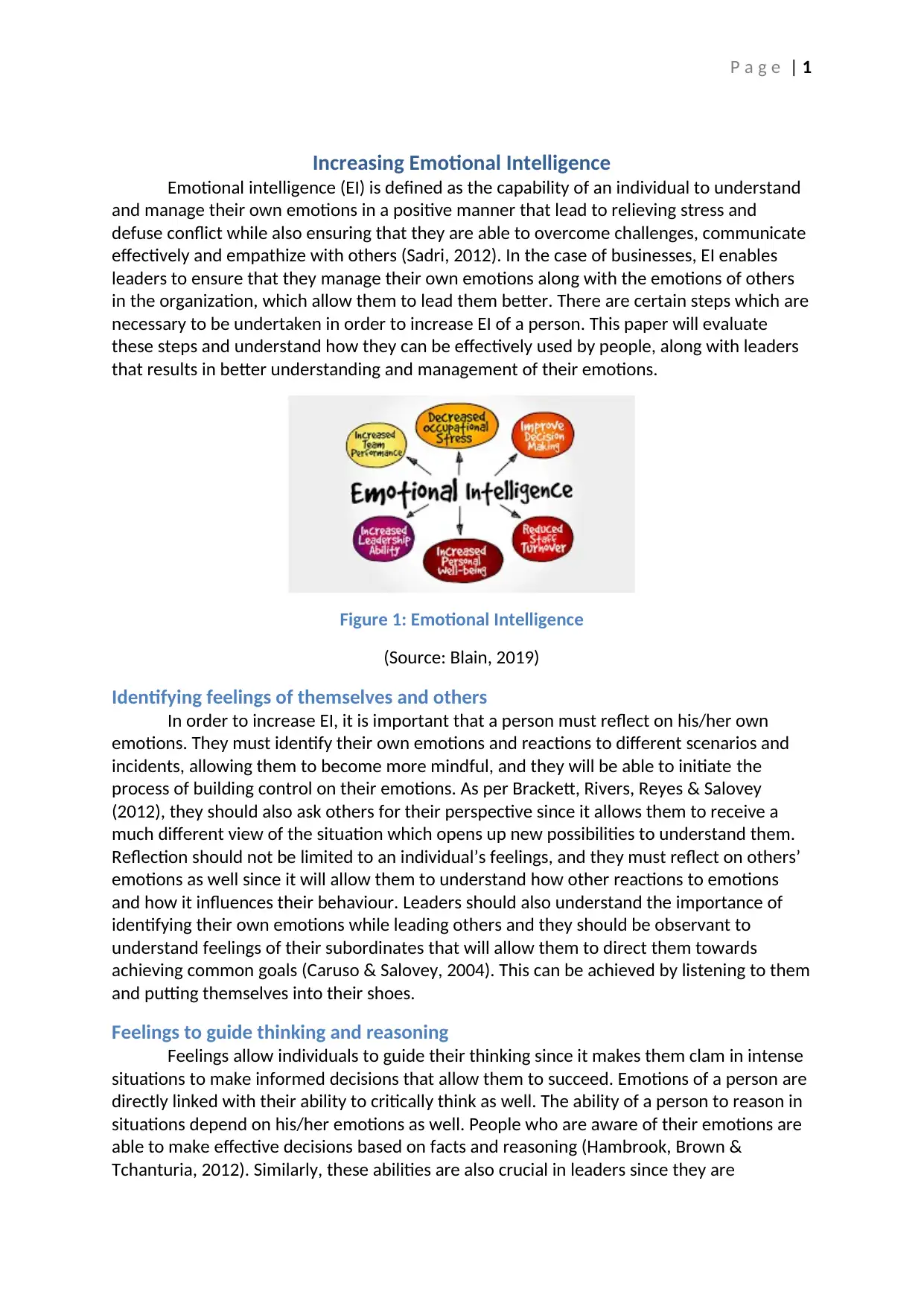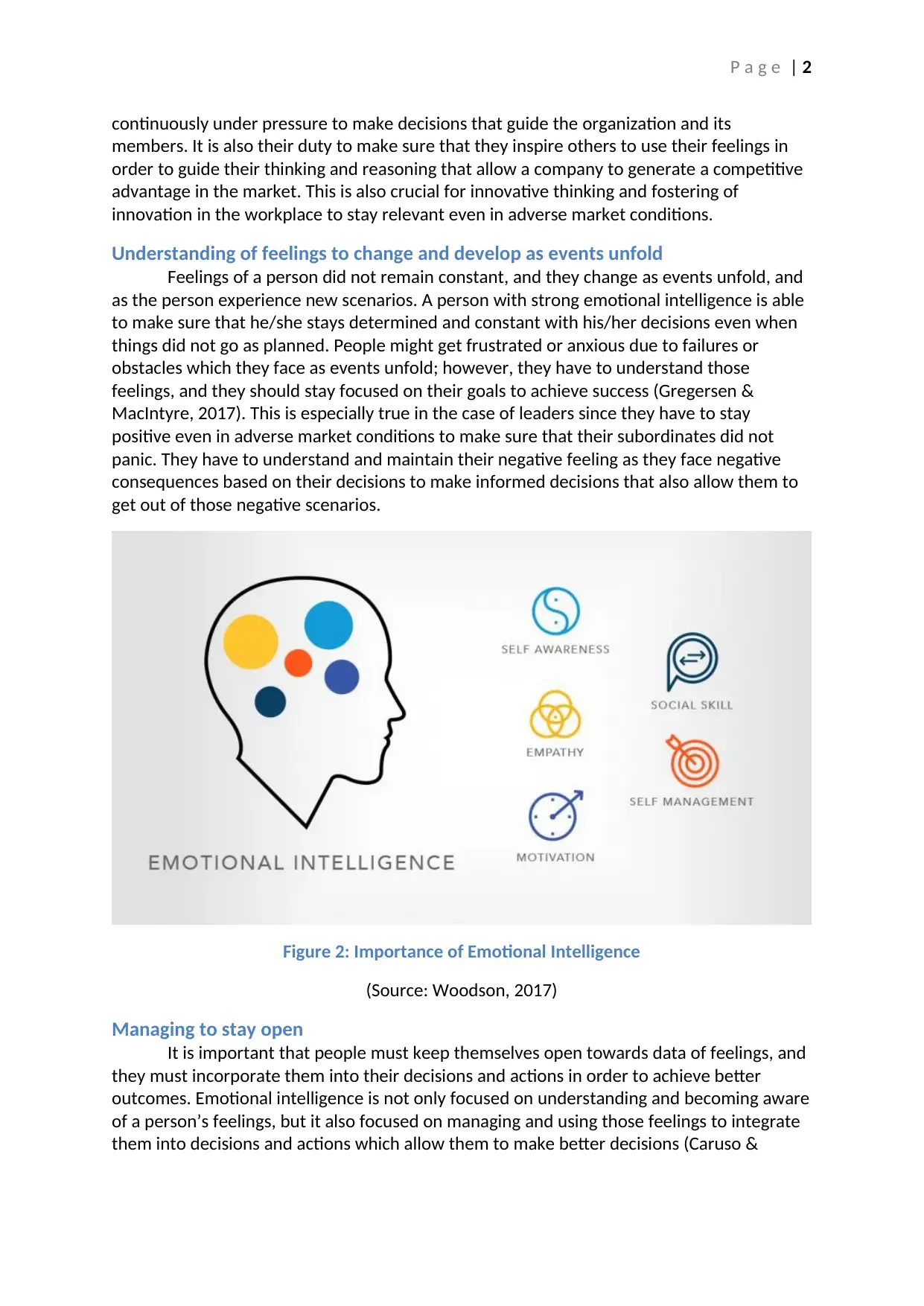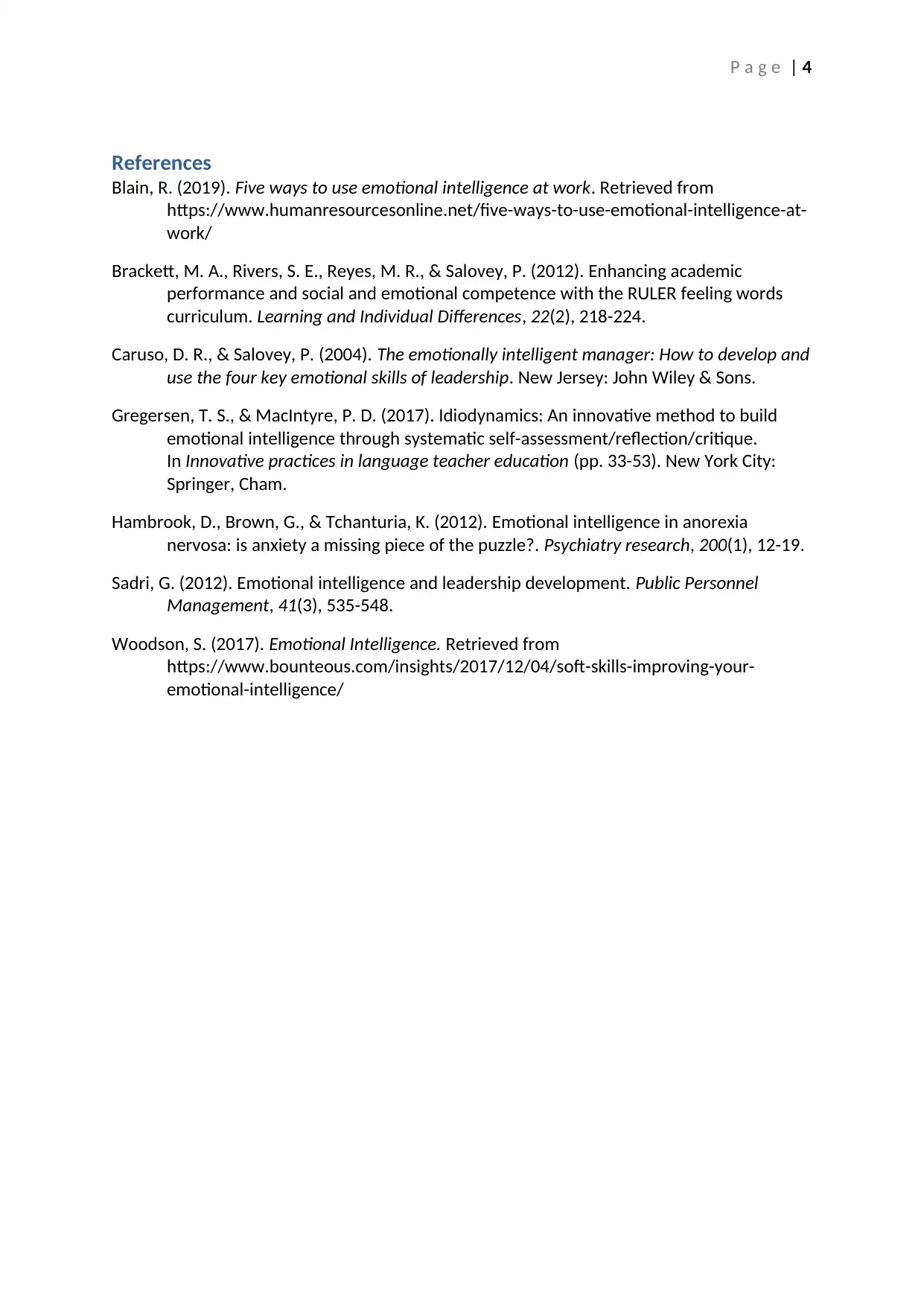Emotional Intelligence: Key Steps to Improve Leadership Effectiveness
VerifiedAdded on 2022/08/29
|5
|1202
|15
Essay
AI Summary
This essay delves into the concept of emotional intelligence (EI) and outlines crucial steps to enhance it. It defines EI as the ability to understand and manage one's own emotions and those of others effectively. The paper emphasizes the importance of identifying feelings, both personal and those of others, to guide thinking and reasoning, and to adapt as events unfold. The essay highlights how leaders can use EI to make informed decisions, inspire others, and foster innovation. It stresses the need to stay open to emotional data and integrate it into actions for better outcomes. The essay provides references to support the discussed concepts and emphasizes the benefits of EI in leadership, decision-making, and overall success.

P a g e | 0
Emotional Intelligence
Emotional Intelligence
Paraphrase This Document
Need a fresh take? Get an instant paraphrase of this document with our AI Paraphraser

P a g e | 1
Increasing Emotional Intelligence
Emotional intelligence (EI) is defined as the capability of an individual to understand
and manage their own emotions in a positive manner that lead to relieving stress and
defuse conflict while also ensuring that they are able to overcome challenges, communicate
effectively and empathize with others (Sadri, 2012). In the case of businesses, EI enables
leaders to ensure that they manage their own emotions along with the emotions of others
in the organization, which allow them to lead them better. There are certain steps which are
necessary to be undertaken in order to increase EI of a person. This paper will evaluate
these steps and understand how they can be effectively used by people, along with leaders
that results in better understanding and management of their emotions.
Figure 1: Emotional Intelligence
(Source: Blain, 2019)
Identifying feelings of themselves and others
In order to increase EI, it is important that a person must reflect on his/her own
emotions. They must identify their own emotions and reactions to different scenarios and
incidents, allowing them to become more mindful, and they will be able to initiate the
process of building control on their emotions. As per Brackett, Rivers, Reyes & Salovey
(2012), they should also ask others for their perspective since it allows them to receive a
much different view of the situation which opens up new possibilities to understand them.
Reflection should not be limited to an individual’s feelings, and they must reflect on others’
emotions as well since it will allow them to understand how other reactions to emotions
and how it influences their behaviour. Leaders should also understand the importance of
identifying their own emotions while leading others and they should be observant to
understand feelings of their subordinates that will allow them to direct them towards
achieving common goals (Caruso & Salovey, 2004). This can be achieved by listening to them
and putting themselves into their shoes.
Feelings to guide thinking and reasoning
Feelings allow individuals to guide their thinking since it makes them clam in intense
situations to make informed decisions that allow them to succeed. Emotions of a person are
directly linked with their ability to critically think as well. The ability of a person to reason in
situations depend on his/her emotions as well. People who are aware of their emotions are
able to make effective decisions based on facts and reasoning (Hambrook, Brown &
Tchanturia, 2012). Similarly, these abilities are also crucial in leaders since they are
Increasing Emotional Intelligence
Emotional intelligence (EI) is defined as the capability of an individual to understand
and manage their own emotions in a positive manner that lead to relieving stress and
defuse conflict while also ensuring that they are able to overcome challenges, communicate
effectively and empathize with others (Sadri, 2012). In the case of businesses, EI enables
leaders to ensure that they manage their own emotions along with the emotions of others
in the organization, which allow them to lead them better. There are certain steps which are
necessary to be undertaken in order to increase EI of a person. This paper will evaluate
these steps and understand how they can be effectively used by people, along with leaders
that results in better understanding and management of their emotions.
Figure 1: Emotional Intelligence
(Source: Blain, 2019)
Identifying feelings of themselves and others
In order to increase EI, it is important that a person must reflect on his/her own
emotions. They must identify their own emotions and reactions to different scenarios and
incidents, allowing them to become more mindful, and they will be able to initiate the
process of building control on their emotions. As per Brackett, Rivers, Reyes & Salovey
(2012), they should also ask others for their perspective since it allows them to receive a
much different view of the situation which opens up new possibilities to understand them.
Reflection should not be limited to an individual’s feelings, and they must reflect on others’
emotions as well since it will allow them to understand how other reactions to emotions
and how it influences their behaviour. Leaders should also understand the importance of
identifying their own emotions while leading others and they should be observant to
understand feelings of their subordinates that will allow them to direct them towards
achieving common goals (Caruso & Salovey, 2004). This can be achieved by listening to them
and putting themselves into their shoes.
Feelings to guide thinking and reasoning
Feelings allow individuals to guide their thinking since it makes them clam in intense
situations to make informed decisions that allow them to succeed. Emotions of a person are
directly linked with their ability to critically think as well. The ability of a person to reason in
situations depend on his/her emotions as well. People who are aware of their emotions are
able to make effective decisions based on facts and reasoning (Hambrook, Brown &
Tchanturia, 2012). Similarly, these abilities are also crucial in leaders since they are

P a g e | 2
continuously under pressure to make decisions that guide the organization and its
members. It is also their duty to make sure that they inspire others to use their feelings in
order to guide their thinking and reasoning that allow a company to generate a competitive
advantage in the market. This is also crucial for innovative thinking and fostering of
innovation in the workplace to stay relevant even in adverse market conditions.
Understanding of feelings to change and develop as events unfold
Feelings of a person did not remain constant, and they change as events unfold, and
as the person experience new scenarios. A person with strong emotional intelligence is able
to make sure that he/she stays determined and constant with his/her decisions even when
things did not go as planned. People might get frustrated or anxious due to failures or
obstacles which they face as events unfold; however, they have to understand those
feelings, and they should stay focused on their goals to achieve success (Gregersen &
MacIntyre, 2017). This is especially true in the case of leaders since they have to stay
positive even in adverse market conditions to make sure that their subordinates did not
panic. They have to understand and maintain their negative feeling as they face negative
consequences based on their decisions to make informed decisions that also allow them to
get out of those negative scenarios.
Figure 2: Importance of Emotional Intelligence
(Source: Woodson, 2017)
Managing to stay open
It is important that people must keep themselves open towards data of feelings, and
they must incorporate them into their decisions and actions in order to achieve better
outcomes. Emotional intelligence is not only focused on understanding and becoming aware
of a person’s feelings, but it also focused on managing and using those feelings to integrate
them into decisions and actions which allow them to make better decisions (Caruso &
continuously under pressure to make decisions that guide the organization and its
members. It is also their duty to make sure that they inspire others to use their feelings in
order to guide their thinking and reasoning that allow a company to generate a competitive
advantage in the market. This is also crucial for innovative thinking and fostering of
innovation in the workplace to stay relevant even in adverse market conditions.
Understanding of feelings to change and develop as events unfold
Feelings of a person did not remain constant, and they change as events unfold, and
as the person experience new scenarios. A person with strong emotional intelligence is able
to make sure that he/she stays determined and constant with his/her decisions even when
things did not go as planned. People might get frustrated or anxious due to failures or
obstacles which they face as events unfold; however, they have to understand those
feelings, and they should stay focused on their goals to achieve success (Gregersen &
MacIntyre, 2017). This is especially true in the case of leaders since they have to stay
positive even in adverse market conditions to make sure that their subordinates did not
panic. They have to understand and maintain their negative feeling as they face negative
consequences based on their decisions to make informed decisions that also allow them to
get out of those negative scenarios.
Figure 2: Importance of Emotional Intelligence
(Source: Woodson, 2017)
Managing to stay open
It is important that people must keep themselves open towards data of feelings, and
they must incorporate them into their decisions and actions in order to achieve better
outcomes. Emotional intelligence is not only focused on understanding and becoming aware
of a person’s feelings, but it also focused on managing and using those feelings to integrate
them into decisions and actions which allow them to make better decisions (Caruso &
⊘ This is a preview!⊘
Do you want full access?
Subscribe today to unlock all pages.

Trusted by 1+ million students worldwide

P a g e | 3
Salovey, 2004). People with strong EI are able to stay open to these experiences, and they
incorporate them into their decision making and actions to achieve better results.
Sadri (2012) provided that leaders also rely on these skills in order to make sure that
they are able to understand their feelings and the feelings of their subordinates and they
use such information in order to improve their decisions that are focused on interests of all
stakeholders. They also take actions based on an effective understanding of feelings of
themselves and others to make sure that others continuously follow them, and they are
able to achieve common corporate goals. It shows that increasing EI requires certain steps
which must be followed by individuals and leaders in order to make informed decisions
which benefit them as well as others around them.
Salovey, 2004). People with strong EI are able to stay open to these experiences, and they
incorporate them into their decision making and actions to achieve better results.
Sadri (2012) provided that leaders also rely on these skills in order to make sure that
they are able to understand their feelings and the feelings of their subordinates and they
use such information in order to improve their decisions that are focused on interests of all
stakeholders. They also take actions based on an effective understanding of feelings of
themselves and others to make sure that others continuously follow them, and they are
able to achieve common corporate goals. It shows that increasing EI requires certain steps
which must be followed by individuals and leaders in order to make informed decisions
which benefit them as well as others around them.
Paraphrase This Document
Need a fresh take? Get an instant paraphrase of this document with our AI Paraphraser

P a g e | 4
References
Blain, R. (2019). Five ways to use emotional intelligence at work. Retrieved from
https://www.humanresourcesonline.net/five-ways-to-use-emotional-intelligence-at-
work/
Brackett, M. A., Rivers, S. E., Reyes, M. R., & Salovey, P. (2012). Enhancing academic
performance and social and emotional competence with the RULER feeling words
curriculum. Learning and Individual Differences, 22(2), 218-224.
Caruso, D. R., & Salovey, P. (2004). The emotionally intelligent manager: How to develop and
use the four key emotional skills of leadership. New Jersey: John Wiley & Sons.
Gregersen, T. S., & MacIntyre, P. D. (2017). Idiodynamics: An innovative method to build
emotional intelligence through systematic self-assessment/reflection/critique.
In Innovative practices in language teacher education (pp. 33-53). New York City:
Springer, Cham.
Hambrook, D., Brown, G., & Tchanturia, K. (2012). Emotional intelligence in anorexia
nervosa: is anxiety a missing piece of the puzzle?. Psychiatry research, 200(1), 12-19.
Sadri, G. (2012). Emotional intelligence and leadership development. Public Personnel
Management, 41(3), 535-548.
Woodson, S. (2017). Emotional Intelligence. Retrieved from
https://www.bounteous.com/insights/2017/12/04/soft-skills-improving-your-
emotional-intelligence/
References
Blain, R. (2019). Five ways to use emotional intelligence at work. Retrieved from
https://www.humanresourcesonline.net/five-ways-to-use-emotional-intelligence-at-
work/
Brackett, M. A., Rivers, S. E., Reyes, M. R., & Salovey, P. (2012). Enhancing academic
performance and social and emotional competence with the RULER feeling words
curriculum. Learning and Individual Differences, 22(2), 218-224.
Caruso, D. R., & Salovey, P. (2004). The emotionally intelligent manager: How to develop and
use the four key emotional skills of leadership. New Jersey: John Wiley & Sons.
Gregersen, T. S., & MacIntyre, P. D. (2017). Idiodynamics: An innovative method to build
emotional intelligence through systematic self-assessment/reflection/critique.
In Innovative practices in language teacher education (pp. 33-53). New York City:
Springer, Cham.
Hambrook, D., Brown, G., & Tchanturia, K. (2012). Emotional intelligence in anorexia
nervosa: is anxiety a missing piece of the puzzle?. Psychiatry research, 200(1), 12-19.
Sadri, G. (2012). Emotional intelligence and leadership development. Public Personnel
Management, 41(3), 535-548.
Woodson, S. (2017). Emotional Intelligence. Retrieved from
https://www.bounteous.com/insights/2017/12/04/soft-skills-improving-your-
emotional-intelligence/
1 out of 5
Related Documents
Your All-in-One AI-Powered Toolkit for Academic Success.
+13062052269
info@desklib.com
Available 24*7 on WhatsApp / Email
![[object Object]](/_next/static/media/star-bottom.7253800d.svg)
Unlock your academic potential
Copyright © 2020–2026 A2Z Services. All Rights Reserved. Developed and managed by ZUCOL.





